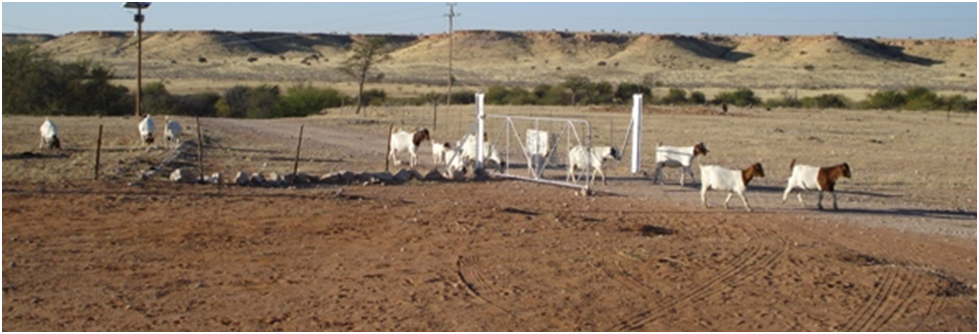
Building on the experience of key conferences like the 1991 National Land Conference and 1994 People’s Land Conference, the LEAD Project has played a key role in the NGO Working Committee on Land Reform and has made representations to the Ministry of Lands, Resettlement & Rehabilitation regarding discrepancies between the National Land Policy and the then Communal Land Reform Bill – the Bill was passed by Parliament in 2002 and became law on 1 March 2003. In 2002 the Project published a report titled “One day we will all be equal” – the outcome of a two year socio-legal research study into Namibia’s land reform and resettlement process.
- Training to Communal Land Boards
LEAD helped implement courses for Communal Land Boards to “implement sustainable development and environmentally sound decision-making principles” when allocating communal land rights. LEAD has also been involved in a training course to provide Communal Land Boards with improved conflict management skills.
Together with other stakeholders all of Namibia´s 12 communal land boards received regular training.
Learn more about the Communal Land Reform Act in this Guide and Training manual.
The Guide to Communal Land Reform Act is in its first edition available in Afrikaans, Otjiherero, Khoekhoegowab, Rukwangali, Silozi, Oshiwambo
- Research into the Land Reform & Redistribution Process
The Namibia Government has greatly valued LEAD’s expertise in the land reform programme, and the impact of LEAD studies on land reform has been extensive. With years of close observation of the land reform process, LEAD has authored several reports on land reform, land redistribution and land expropriation.
The following LAC produced publications are based on land reform in Namibia:
-
- The Seditious State: How to shake the poor from the communal-land safety net (2021) Peter Watson
- Institutionalisation and institutional voids of Namibia’s Communal Land Reform Act (2021) Paul Hebinck
- The role of Constitutional and International law in the development of ancestral land rights claims In Namibia (2021) Willem Odendaal
- Land governance on Communal land in Namibia (2021) Wolfgang Werner
- Neither here nor there:“: Indigeneity, marginalisation and land rights in post-independence Namibia (2020)
This publication summarises the legal reforms on land and links to the history of land settlement in Namibia. - “One Day We Will be Equal“: A Socio-Legal Perspective on the Namibian Land Reform and Resettlement Process (2002)
This publication summarises the legal reforms on land and links to the history of land settlement in Namibia. - “Our Land We Farm”: An Analysis of the Namibian Commercial Land Reform Process (2005)
One of the first evaluations of the land reform proess im commercial agricultural areas. Includes a summary of legal reforms, data on the consequences and recommendations. - A place we want to call our own: a study on land tenure policy and securing housing rights in Namibia (2005)
- No Resettlement Available…(2007)
An in-depth investigation of the first three commercial farm expropriations in Namibia. The publication offers an analysis of the legal process, what’s been accomplished and makes recommendations. - Manual for Communal Land Boards: Powers and procedures for handling land issues (2007)
- Kessl – A New Jurisprudence for Land Reform in Namibia (2008)
This publications looks at the first legal test of land expropriation in Namibia. The case, which addresses many aspects of the Ministry of Lands and Resettlement programme on land reform, upheld the principle of land expropriation but found the Ministry’s administration of the process violated Namibian law on several grounds. - Protection for Women in Namibia’s Communal Land Reform Act: Is it Working (2008)
This research report investigates land rights for women in the four north-central regions of the country. The right of women to own land, and more specifically to inherit land in their own right is an increasingly topic issue as the HIV/AIDS pandemic continues to take its toll. Arguably, for the Namibian public and government, the single most important aspect of women’s rights to land, or the lack thereof, has been the eviction of widows from the land they have cultivated.
Read a Press Release about this Publication - Grazing rights in Namibia’s communal areas: A case study of a local land grabbing dispute in Western Kavango region (2014)
A case study from Northern Namibia looks at the Owambo herders, faced by difficulties with grazing rights, fencing off of land and an eviction order. The study looks at the impact of the eviction order on the different groups involved, and to what extent it has been resolved. (by Theodor Muduva) - Leasehold as a vehicle for economic development in Namibia: a case study of small-scale farmers in Namibia’s Oshikoto region (2017)(Wolfgang Werner and Charl-Thom
- Leasehold as a vehicle for economic development in Namibia Policy brief (2017)(Wolfgang Werner and Charl-Thom Bayer)
- In the Margins: a qualitative examination of the status of farm workers in the Commercial and Communal farming areas of the Omakeke region (1995)
- Research Report Series No. 1
James Suzman for the Farm Workers Project of the LAC - A Survey of individual Labour Disputes at selected District Labour Courts in Namibia 1994
Research Report Series No. 2
Vemunavi Katjiuanjo, Clement Daniels with Emmanuel Ndauendapo - Farmworkers Wages in Namibia: an Analysis of wage structure and possibility of Minimum Wages
Research Report Series No. 3
Simana Chimana and Mbakumua Hengari - Overview of the Agricultual sector in Namibia
Research Report Series No. 4
Omu Kakujaha-Matundu and Selma Tuemumunu Kavezeri - Labour Relations in the Agricultural sector of Namibia
Research Report Series No. 5
Vemunavi Katjiuanjo


